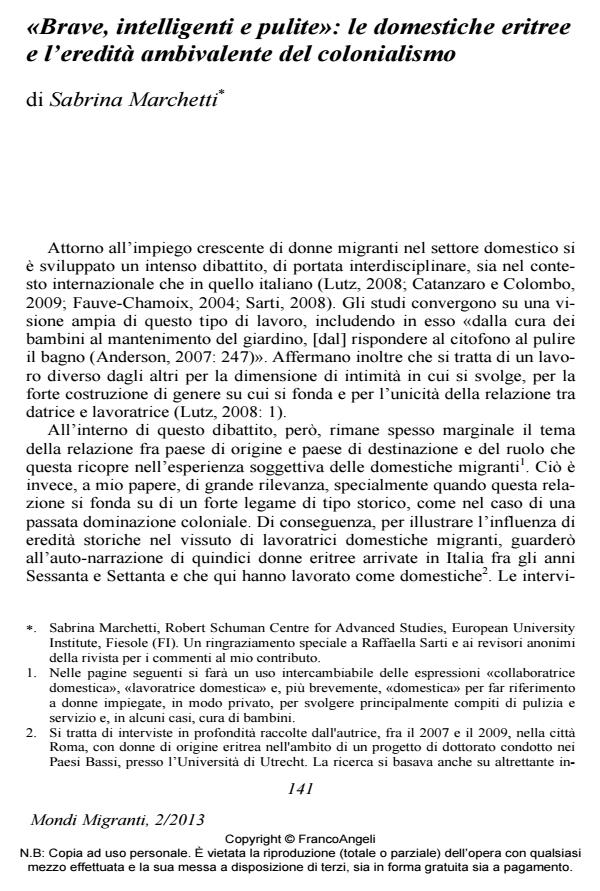"Brave, intelligenti e pulite": le domestiche eritree e l’eredità ambivalente del colonialismo Abstract Titolo in inglese: "Good, smart and clean": Eritrean domestic workers and the ambivalent inheritance of colonialism
Journal title MONDI MIGRANTI
Author/s Sabrina Marchetti
Publishing Year 2013 Issue 2013/2
Language Italian Pages 16 P. 141-156 File size 646 KB
DOI 10.3280/MM2013-002009
DOI is like a bar code for intellectual property: to have more infomation
click here
Below, you can see the article first page
If you want to buy this article in PDF format, you can do it, following the instructions to buy download credits

FrancoAngeli is member of Publishers International Linking Association, Inc (PILA), a not-for-profit association which run the CrossRef service enabling links to and from online scholarly content.
Aim of this article is to contribute to the debate on migrant domestic labour by drawing attention to the relevance of the relationship between the country of destination and the one of origin in the narrative of one’s migratory and labour experience. This is particularly relevant when a past colonial domination affects this relationship. Therefore, the article focuses on the narratives of fifteen Eritrean women who arrived in the city of Rome between the years 1960s and 1970s. Their stories reveal a crucial overlap between the «postcolonial» dimension of their experience and the one work in the domestic sector which concerns, more generally, migrant women in Italy. With reference to the notion of postcolonial cultural capital the article emphasises the role in these women’s process of subjectification of the pre-migratory phase. This took place in Eritrea, where they have been exposed to Italian cultural practices and to the social hierarchies associated with them. This is now described as a preparation for their labour in Italy. In this light, the argument is made about a fundamental «ambivalence» of the colonial past in shaping the narratives of the interviewees. The representations which are associated with migrant women carry two opposite outcomes: on the one side they smoothed their entrance in the sector and, with that, the fulfilment of their migratory project; on the other they triggered stigmatisation and labour segregation in the society of the former colonisers. The women that have been interviewed tell us about a life on the edge of these two opposite outcomes, in which to be Eritrean has been simultaneously the reason of their subordination, and their tool for resistance.
Keywords: Domestic labour, Rome, cultural capital, colonialism, Eritrea.
- "Solo di passaggio": l'Italia nelle rappresentazioni e nelle pratiche di mobilità dei giovani eritrei Milena Belloni, in MONDI MIGRANTI 2/2016 pp.249
DOI: 10.3280/MM2016-002013 - Languages of Discrimination and Racism in Twentieth-Century Italy Marcella Simoni, Davide Lombardo, pp.1 (ISBN:978-3-030-98656-8)
Sabrina Marchetti, "Brave, intelligenti e pulite": le domestiche eritree e l’eredità ambivalente del colonialismo in "MONDI MIGRANTI" 2/2013, pp 141-156, DOI: 10.3280/MM2013-002009